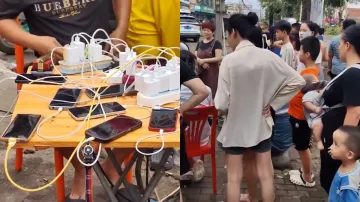Yagi, Asia's most powerful storm of the year, made landfall in China's Hainan province on September 6, unleashing heavy rain and wind speeds of 234 kilometers per hour. The super typhoon caused widespread blackouts, creating challenges for residents in the aftermath. Now, an X thread is gaining attention, highlighting the "Downside of a cashless society." In a video shared by a user, locals can be seen charging their mobile phones at a temporary station in a crowded area, with the vendor apparently using an engine as the power source.
The caption stated, “After the typhoon, the water and electricity were cut off. Chinese people desperately want to charge their phones as all their money is in their mobile phones. Without a mobile phone, you can’t even buy a piece of bread.”
Watch it:
A different video highlighted the disadvantages of electric vehicles, depicting people stranded and rushing to charging stations to recharge their batteries.
It also mentions that recharging electric cars is limited to users of WeChat, China's digital wallet, who have a social credit score of at least 550.
It was noted that China's digital currency includes "expiration dates," meaning that if the currency isn't spent within a certain timeframe, it will become invalid. Moreover, if your account or digital wallet is frozen by the social credit system, access to your digital currency will be restricted.
It also mentioned that the use of digital currency via WeChat for payments was not allowed during COVID-19 if your vaccination passport had expired, at which point the code in your COVID app would turn red.
It also mentioned that during the COVID-19 pandemic, China’s digital wallet, WeChat or Alipay, restricted access to digital funds if your vaccination passport expired, as WeChat serves as both the contact tracing and vaccine passport app in China.
As stated in the thread, the country set up "quarantine camps," described as "literally concentration camps," to detain anyone who refused vaccinations.
